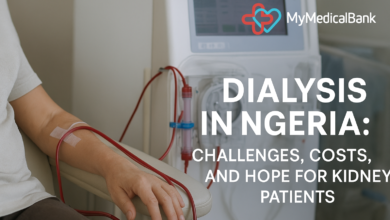How to Run and Grow Your Healthcare Organisation Successfully through Adopting Low-Cost Digital Technology

Growing Healthcare Organisations by Adopting Low-Cost Digital Technology is what should be on the mind of medical practitioners now.
Hospitals, medical laboratories, pharmacies, care agencies, HMOs, medical logistics companies and other healthcare organisations in Nigeria have been slow to embrace digital transformation.
Unlike other sectors like banking, commerce, communications, transport and education that have witnessed phenomenal growth in revenue and automation through adopting digital technology in the last two decades, the healthcare sector has been extremely slow in catching up.
The need for Digitizing Healthcare Organisations
Fewer than 10% of the 38,000 hospitals, clinics and primary care centres in Nigeria utilise any form of electronic medical records system, hospital information system or video teleconferencing platform.
The vast majority of nursing agencies, care homes, rehabilitation centres and home care providers do not use any client management platform other than paper files and spreadsheets.
Majority of healthcare providers lack the capacity to access information required to support and monitor service delivery instantly. Most are unable to collaborate with other providers for multi-disciplinary engagement and timely exchange of patient information.
Fewer than 18% have a mobile-friendly website or an online presence through which patients can schedule an appointment or engage with the provider other than by visiting the facility in person or making a phone call.
Decentralization of healthcare aggravated by low adoption of digital technology makes it even more difficult for providers to market themselves, achieve efficiency with limited staff and encourage patient engagement.
For instance, healthcare price comparison websites are virtually absent in Nigeria. Outside of social media, there are virtually no platforms available for the public to access psycho-social support.
In essence, healthcare organisations have not provided consumers adequate options to book and manage from their phones, services like a health checks, health insurance, ambulance service, outpatient appointment, diagnostic tests, elderly care, mental health counseling, rehabilitation, home care, maternal services and many more.
Basic Requirements for Digitizing a Healthcare Organisation
As an overview, there are basic requirements to pivot any healthcare organisation to the digital space. They include computing device (desktop, laptop, tablet, or smartphone), internet access (via broadband or cellular data) electricity supply to power the computing devices and broadband router (public power, inverter, solar panel, generator, UPS or power bank) and the software installed on the computer or a web-based application.
A scanner may be required to digitise existing paper records. An organisation may also opt to set up intranet premised on a Local Area Network (LAN) for their own internal communication and exchange of information.
7 Benefits Healthcare Practice Lose by Failing to Adopt Digital Technology in Growing Health Organisations
Because everything has a cost. By failing to embrace digital transformation, your healthcare facility will be losing out on the opportunity to automate and streamline workflows and many other significant benefits that may drive you to business in the long run.
Income-generating opportunities
All businesses are competitive, and healthcare practices are not excluded. By failing to digitize your service, you do not only risk losing out to your competitors. You also risk losing opportunities to expose your service offerings to a wider audience, automate your sales funnel and attract constant a stream of clients including from locations where you do not have a physical presence.
So, Digital technology makes it easier for consumers to find and engage with your organisation and to pay for services received.
Reduced corruption, errors and waste
Healthcare providers lose a substantial amount of money to corruption whether it is through diversion of payments or false time recording by staff or it is a falsification of claims or impersonation by patients. Leveraging digital technology will help your facility to curtail this.
Digital technology will also help you reduce waste – time and efforts wasted in tracking clients’ engagements, updating client information, finding patient records, retrieving business information, measuring performance or monitoring inventory.
Pivoting from inefficient manual and paper-based processes to digital recording will significantly reduce errors. Whether it is adopting EMR by hospitals or a client management platform by providers in general, it is far easier to prevent, minimize or detect errors through digital platforms than through paper records.
Increased staff productivity
By not investing in digital tech tools, inevitably you will be limiting your staff’s capacity to be optimally productive. In hospitals, for instance, many doctors spend time on administrative tasks instead of attending to patients because the task requires manual labour. This should be looked into to ensure growing Healthcare Organisations
Timely access to client information and patient records
Digitization offers tremendous opportunities for improved and timely access to client information and medical records. One of the biggest benefits of the digital revolution has been the ability to store and access data. With digitisation, healthcare professionals can now retrieve and analyze patient information at the click of a button.
Improved patient experience and patient satisfaction
With 108 million Nigerians now using the internet and 40 million using smartphones, the demand for instant access to online services has grown exponentially in recent years. One area digitization has had a tremendous impact on healthcare is in reducing patient waiting time.
It is no longer necessary for patients to visit the hospital or a health facility first to find out if certain doctors or services are available or for them to wait endlessly congesting the waiting room in order to see a doctor, book a test or even return there to collect the test result.
By failing to digitize, your healthcare practice will continue to lose out on opportunities to improve the patient experience. Inevitably you will lose out to the competition.
Timely exchange of information with other providers
Healthcare as a system involves various parties working collaboratively to achieve desired outcomes for the healthcare consumer. From making referrals, sending prescriptions and ordering tests to processing insurance claims and participating in multidisciplinary meetings, digitisation facilitates providers’ participation in this process.
By not adopting digital technology, your organisation’s capacity to participate optimally in that ecosystem will be greatly impaired.
How to Digitize and ensure the Growing of Healthcare Organisations
Whether your organisation is small or large, private or public, clinical or non-clinical, there are a number of ways you can adopt digital technology in your hospital, laboratory, care agency, care home, HMO, or health logistics company thereby growing Healthcare Organisations by Adopting Low-Cost Digital Technology.
Have a Website
In scaling your facility, it will be of tremendous benefit to have a mobile-friendly website. The website must be designed to have a quick loading time ideally between 7 to 15 seconds and must offer at the minimum, information about your services, your contact details, and an appointment booking form.
So, If your organisation does not already have a website, you can have a mini one set up for you under 15 minutes by onboarding as a ‘Corporate Organisation’ on MyMedicalBank Health Market.
Growing Healthcare Organisation by Adopting Low-Cost Digital Technology requires a website.
For hospitals, clinics, medical laboratories and diagnostic centers, Clinic Visit offers a tremendous opportunity to have patients book and pay for an outpatient appointment or medical test in advance before they turn up at your facility.
Embrace Digital Marketing
Your prospective patients and clients live in a digital world, it makes every sense to reach them there where they are. More and more Nigerians are now searching for information about health and care services, health conditions, and health products online particularly from their mobile phone.
Growing Healthcare Organisations with Digital Technology requires Digital Marketing.
Embrace Social Media
Aside from having a website and optimizing it for search engines, you should also set up social media account, particularly on Facebook, Instagram, LinkedIn, and Twitter. It is also helpful to have a WhatsApp Business and integrate it with your website and Facebook page.
In addition, enlist your organisation in an online healthcare marketplace or directory. Health Market – Nigeria’s no.1 online healthcare marketplace offers healthcare organisations the opportunity to showcase their services to thousands of healthcare consumers who visit the platform daily and to start taking bookings and payments immediately.
Implement Electronic Medical Records (EMR) or Hospital Information System
If you run a hospital or clinic, digitize your medical records and migrate them to an EMR or HIS. EMR systems automate the documentation, storage, and retrieval of patient history and records. You can opt for a variety of software currently on the market or pre-register for MyMedicalBank EMR.
With HIS, aside from managing patient medical records, it becomes possible to streamline hospitals’ operations – billings and payments, lab requests, medication management, HR, payroll, and others on a single platform.
Onboard on a Telemedicine Platform
Onboarding on a doctor-on-demand app like MyMedicalBank Telemedicine is one of the steps you can take to digitize your practice.
Through this type of Telemedicine platform, you will be able to assign doctors and other healthcare professionals in your facility to provide virtual video medical consultation, remote diagnosis, and follow-up to patients from anywhere in the world. Patients are able to share their medical images with doctors while the doctors in turn can write prescriptions, make a referral or share the report of the consultation with the patient.
A registered healthcare facility can be set up on MyMedicalBank Telemedicine in under 15 minutes. An approach like this – onboarding on an existing cloud-based enterprise solution is far cheaper and more cost-effective for the typical facility than spending millions of Naira building their own Telemedicine from the scratch and spending substantially again to recruit and maintain a technical team to support the application.
Integrate your EMR with Personal Health Record (PHR) and Wearable Tech
With more patients interested in having access to their own health records and playing a more active role in managing their health, by integrating your EMR to a PHR, wearable technology, or home-based medical monitoring equipment, Integration with other systems and other physicians: Cloud-based software has made it easy to share things.
You can use it to interact with physicians from other practices, send over information to referrals at the click of a button without putting confidentiality at risk. In addition, when choosing a technology, you opt for software that can be integrated easily with one another. This will create a seamless and uninterrupted channel for work.
Onboard a Client Management Platform
While EMR systems are primarily designed for hospitals, there are numerous bespoke digital solutions designed for other healthcare organisation for managing their client information.
Laboratory Management System (LMS) for instance allows streamlining of day-to-day lab functions from tracking and categorizing reagents and chemicals to billing, storing, and sharing patients’ information with doctors.
HomeCare allows nursing agencies, care agencies, hospitals, physiotherapists, and other providers of domiciliary and out-of-hospital care to take bookings and payments from the public, assign health workers to the booking, and track and share information with the clients or their families.
Invest in Cybersecurity
A vital component of digitisation is to take necessary measures to protect the confidentiality and security of your organisation’s information architecture. The key requirement is to implement protocols that ensure that the organisation’s health system is compliant with statutory data regulations through how access to clients information is managed. Growing Healthcare Organisations require investment in Cybersecurity.
Train your clinical and non-clinical staff
Offer your staff adequate training sessions to get them acquainted with the digital solutions your organisation is implementing in order to ensure a smooth transition and optimal usage.
What other basic digitization processes for healthcare organisations would you like to add? Share thoughts by leaving a comment below. Would you like to be supported to pivot your facility to the digital space? Let us know by sending an email to [email protected].
www.mymedicalbank.com is Nigeria’s no.1 digital platform that connects consumers with healthcare providers, health information and their health records from their smartphones. For enquiries, go to www.mymedicalbank.com/contact.



